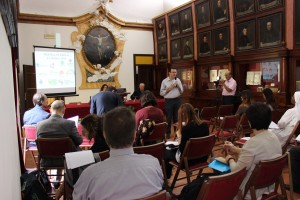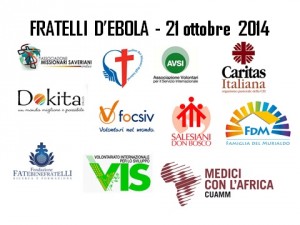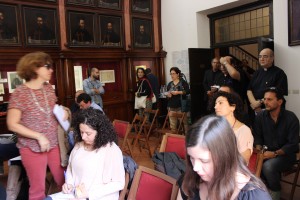This morning, under the austere and committed gaze of the portraits of the ‘General Superiors’ in the generalate house, we had a compelling laboratory of ideas about the emergency generated by Ebola, above all in Africa (Liberia, Sierra Leone, Guinea Conakri) – countries which have already been afflicted by two decades of civil war and endemic poverty.
Various religious institutes and voluntary and international cooperation organisations were present and these had organised the event: the DOKITA Association of Volunteers ONLUS; Italian Caritas; the Camillians; the Fatebenefratelli – the Hospital Order of St. John of God; CUAMM – Doctors with Africa; the FOCSIV – Volunteers in the World; the AVSI Foundation– NGO ONLUS; the Josephites of Murialdo; the Savarian Missionaries; the Salesians of Don Bosco; and the VIS – International Volunteers for Development.
The objective was to call for the greater and effective involvement of national and international civil organisations.
In these countries there is the problem of care and access to minimal treatment for ‘ordinary’ illnesses. Ebola has generated a kind of psychosis. Not only has it been impossible to face up to the problem but, in addition, fear of further contagion has also blocked other initiatives of a health-care character (people also die at childbirth!); there is concern about food security (people in quarantine are impeded from moving and as such encounter difficulties in obtaining basic alimentation); there is a cultural and social problem (here we are referring to informing the population about the risk of being infected by a disease that is absolutely new; above all religious leaders should use their authority to communicate and inform to achieve a minimal form of health-care prevention); and there is an emergency of justice (in these areas the health-care, political and social systems are very fragile). We are dealing, therefore, with supporting today and strengthening tomorrow the health-care, food, cultural, social and civil systems in these specific geographical areas.
The following expressed their views during this laboratory:
Msgr. Emmanuel Felemou, the Bishop of Kankan and the President of the Bishops’ Conference of Guinea Conakry, described the general picture of the reality in his country: he referred to a recent visit to the areas most infected by Ebola; he emphasised the need for, and requested help to achieve, greater commitment to prevention; and he highlighted the importance of the involvement of religious leaders who – in a context already inclined towards a certain kind of faith in magic – should send a message of hope to people, avoiding all references to the subjects of divine punishment or scourge.
Fr. Natale Paganelli – and together with him Fr. Aris Miranda, a Camillian religious – the Apostolic Administrator of the diocese of Makeni, in Sierra Leone, who is organising in loco a task force for action starting with a small local hospital which is entrusted to his management. The concern is not only to manage today but also to organise small but concrete and farsighted actions over the next months to limit the epidemic or its possible new flare-up. Fr. Aris related his first impressions after making certain preliminary visits in the city and to the hospital: the situation is very critical at a health-care level but above all at a social level (there is a curfew that wants to stop contagion but which in reality also impedes the supply of basic commodities). Food security is requested above all for those families who have been put in quarantine; there is a need for the taking in of orphans of parents who have already died because of Ebola; and also a need for an institution and equipment for screening, at least at a primary level, for contagion, in order to be able to save those who have been infected and at the same time allow the re-opening of the hospital for the treatment of other illnesses which require ‘ordinary’ management.
Father Maurizio Boa, a Josephite of Murialdo, connected by telephone from Freetown, described the state of emergency of the population of his area. The quarantine imposed by the government authorities by now is hindering access to food and treatment. The dramatic novelty of Ebola, compared to other epidemics of the recent past, has struck the capital cities and the great urban centres and this notably limits connections and communications with the outlying areas. This situation has brought about an indiscriminate increase in the price of foodstuffs: the limitations imposed on movement has by now impeded the exchange of goods between the agricultural and rural areas and the urban centres, which should, however, be able to draw upon these resources.
Brother Michael Koroma of the Fatebenefratelli from Lunsar, in Sierra Leone, confirmed the presence of an authentic humanitarian emergency in his area: there is a lack of technical equipment for the initial screening of those infected with Ebola, in addition to child malnutrition (which is also caused by an increase in the prices of foodstuffs), to deaths at childbirth, and to an increased number of deaths caused by cholera, by malaria and by other ordinary tropical diseases brought about at the present time by the onset of the rainy season. The four dollars needed for the treatment of malaria is a sum that the vast majority of the local population cannot afford. There is a great deal of concern about the opening of the local hospital because in order to treat in safety, training and technology is required, for health-care workers as well.
Br. Marco Fabello, of the Fatebenefratelli, posed a searing question: when did the world become aware of Ebola? Why since the first explosion of Ebola in the middle of the 1990s, has nobody – or very few people – tried to find answers at the level of a vaccine to the virus or to plan for the future? This only happened when Ebola hit Westerners! This question has to be addressed. There have been deaths not only amongst the local populations but also amongst those who have cared for them: this is the exaltation of gratuitousness; it is the completion of a baptismal and religious consecration.
Msgr. Robert Vitillo, the delegate of Caritas Internationalis, Geneva, and the delegate for health and HIV, once again drew attention to the need for prevention with a view to the reopening of religious and civic hospitals. It is necessary to inform the population and implement basic measures of precaution and prevention. The WHO (World Health Organisation) is very much involved in the Ebola emergency and seeks to provide immediate information to national governments about the development of the epidemic. However, the aim is to support but not to supplant national governments. The problem is that the governments of the countries in question have very weak and frail organisational and political structures. Liberia and Sierra Leone are poor countries which have just come out of civil wars and they lack economic and technical resources. He complained about the lack of true information in the West: the Western world and Western information are very much folded in on the few cases of contagion in the West, thereby running the risk of not making people aware on a broad scale of the tragedy that is taking place in Africa. Brother Marco communicated the intention of his religious Order to reopen the hospital in Sierra Leone, but it is necessary to better define the assessment and prioritising of patients as regards admission in order to reduce the possibility of the contagion of other patients and those health-care workers who work in direct contact with patients.
In the West Ebola is spoken about but because of fear, self-referential fear, fear that diverts our gaze from the real tragedy of Africa: it diverts our gaze from the fact that the number of deaths caused by other tropical diseases has increased, people die at childbirth, there is a lack of foodstuffs and those that are available are increasingly expensive. It should be pointed out that the real focus of the Ebola emergency is not Europe but Africa!
In addition, international attention and sensitivity should be kept at a high level when the floodlights of the mass media are turned off. Ebola will end but it will leave behind it devastated communities, social and civil structures that are more fragmented than ever before, and it will be necessary to go on sustaining these communities, supporting them, and raising their standards.
We now have to go from ideas, from feelings and from strong and involving testimonies to the facts and to concrete projects! We ask help and cooperation from everyone, together with the spiritual support of friendship and prayer!

















Camillians on Facebook
Camillians on Twitter
Camillians on Instagram